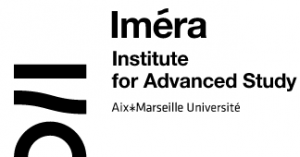North/South. Work, cultures, utopias
TEC/CRIAC / Iméra Chair
This chair focuses on interdisciplinary research around “work utopias,” addressing the themes of agricultural and artistic labor in the contexts of Northern and Southern Europe. The proposed approach aims to encourage the emergence of innovative models, based on cooperation, interaction, and the recognition of the various stakeholders involved.
Any interested artist and/or scientist may apply for only one position among those offered above. Applicants who are former Iméra residents may reapply at least 5 years after their initial research stay.
Chair Format
The chair involves two periods of five months each, dedicated to research on comparable work utopias in two different geographical locations, within distinct scientific and artistic contexts, yet in mutual dialogue and cooperation.
The first period (South) will take place as a residency at an institute for advanced studies, focusing on field research, reflection, and deepening of the project’s content with other resident researchers at Iméra, and institutes and laboratories within the Aix-Marseille University ecosystem. The research project should align with the thematic lines of the “Necessary Utopias” and “Arts and Sciences: Undisciplined Knowledge” programs.
The second period (North), characterized by greater mobility, will be dedicated to field research, discussion, and shared project design with TEC/CRIAC in Roubaix and its scientific and artistic partners.
During both residency periods, the chair holder will conduct research and fieldwork in collaboration with one or more groups of workers and other actors concerned by the project themes.
Chair Objectives
The chair seeks to foster innovative and interdisciplinary artistic and scientific research around one or both core themes:
- Utopias of Agricultural Work between North and South
- Utopias of Artistic Work between North and South
1. Utopias of Agricultural Work between North and South
Applicants are encouraged to explore issues of coexistence, neighborhood, seasonality, and broader encounters through the lens of migrant communities working as seasonal laborers in the agricultural spaces of Northern and Southern Europe.
Projects should investigate how the arrival of a seasonal laborer community transforms both agricultural works, linked to migration and cheap labor, and the landscape, public space, domestic life, and new forms of citizenship.
The project will aim to concretely investigate necessary utopias in agricultural work, imagining tools, experiments, and inventions that promote the relational dimension of work and explore the notions of encounter and recognition for all stakeholders (seasonal workers, employers, residents, artists).
2. Utopias of Artistic Work between North and South
Applicants’ projects should explore and compare locations in Northern and Southern Europe where artists have organized or aspire to organize their work, living, and cohabitation in alternative, perhaps utopian, ways.
Projects should examine the complex dimensions of emancipation and individual and collective self-realization that artistic work embodies, without ignoring the contradictions and constraints imposed by the economic, political, social, and artistic context – the “Big World.”
The project shall aim to investigate necessary utopias of artistic work, focusing on tools, experiments, and inventions that promote the relational dimension of work, exploring more precisely the notions of encounter and recognition for all stakeholders.
Themes: Work, utopias, migration, North/South, cohabitation, alternatives, neighborhood, new forms of citizenship, agricultural work, artistic work, alternatives, emancipation.
Timeline
Deadline for application : Tuesday 10th December 2024, at 1 p.m. (CET).
Selection result announcement : begining of February 2025.
Residency duration: 10 months, divided into two mandatory 5-month periods.
– First period of 5 months in Marseille (Iméra): from September 1, 2025 to January 30, 2026.
– Second period of 5 months in Northern Europe (including Northern France) with TEC/CRIAC in Roubaix: from February 9, 2026 to July 7, 2026.
Eligiblity
For scientists :
- Must not have resided in France for more than twelve months in the three years preceding the call for applications;
- Must hold a PhD or equivalent;
- Must have a work contract (permanent or not) at a foreign university or research institution during the residency.
For artists :
- Must be under a work contract (permanent or not) at the time of the residency;
- Must not have resided in France for more than twelve months in the three years preceding the call for applications.
Compensation and accommodation
In Marseille
Compensation
Artists and scholars alike will receive a compensation amounting to 2,500 euros per month for five months.
Accommodation
Selected candidates will receive travel support and free accommodation in one of Iméra’s fourteen apartments, located in the Parc Longchamp, in the center of Marseille.
In Northern Europe, including Northern France:
An allowance of 5,000 euros will be provided to cover residency and travel expenses.
About the Chair partner
TEC/CRIAC – WORK AND CULTURE, Center for Research, Artistic and Cultural Innovation (related to the world of work) is a cultural structure based on the belief that every person holds and produces culture, and that work is a bearer of culture. From its base in the Hauts-de-France region and in connection with other territories in France and abroad, TEC/CRIAC develops cultural and artistic projects on work and the world of work, examining its changes.
The association seeks to organize public debates on how individuals, alone or in groups, express their views on the world, focusing on today’s key issues in the broad field of work. This approach mobilizes both the symbolic perspectives of artists and the more detached views of researchers. TEC/CRIAC (Work and Culture) strives to co-create hybrid projects at the crossroads of cultural action, artistic creation, and scientific research, collaboratively developed between employees (or unemployed persons), artists, and researchers, with the support of collective actors from the world of work, such as unions, companies, works councils, and associations.
For more information : https://travailetculture.org/
